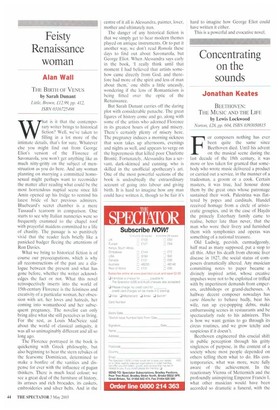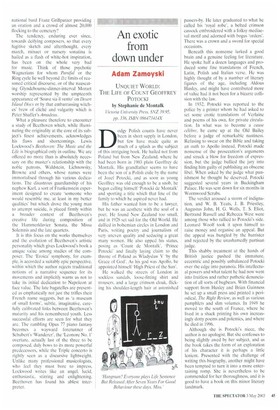Concentrating on the sounds
Jonathan Keates
BEETHOVEN: THE MUSIC AND THE LIFE by Lewis Lockwood Norton, 128, pp. 604. ISBN 0393050815 For composers nothing has ever been quite the same since Beethoven died. Until his advent on the musical scene during the last decade of the 18th century, it was more or less taken for granted that somebody who wrote music delivered a product or carried out a service, in the manner of a tradesman, a groom or a cook. Certain masters, it was true, had honour done them by the great ones whose patronage sustained their work. Palestrina was flattered by popes and cardinals, Handel received homage from a circle of aristocratic groupies, and in the case of Haydn the princely Esterhazy family came to realise, better late than never, that the man who wore their livery and furnished them with symphonies and operas was something of a national treasure.
Old Ludwig, peevish, curmudgeonly, half mad as many supposed, put a stop to all this. After his death from chronic liver disease in 1827, the social status of composers dramatically altered. Any musician committing notes to paper became a divinely inspired artist, whose creative impulses were not to be exploited or trifled with by impertinent demands from emperors, archbishops or grand-duchesses. A halfway decent composer nowadays has carte blanche to behave badly, beat his wife, run up eye-popping debts, make embarrassing scenes in restaurants and be spectacularly rude to his admirers. This is how we want genius to go through its circus routines, and we grow tetchy and suspicious if it doesn't.
Beethoven engineered this crucial shift in public perception through his gritty singleness of purpose, in the context of a society where most people depended on others telling them what to do. His contemporaries, what was more, were fully aware of the achievement. In the reactionary Vienna of Metternich and the profoundly uninspiring Emperor Francis I, what other musician would have been accorded so dramatic a funeral, with the national bard Franz Grillparzer providing an oration and a crowd of almost 20,000 flocking to the cemetery?
The tendency, enduring ever since, towards deifying composers, so that every fugitive sketch and afterthought, every march, minuet or nursery sonatina is hailed as a flash of white-hot inspiration, has been on the whole very bad for music. Think of those psychotic Wagnerians for whom Parsifal or the Ring cycle lie well beyond the limits of reasoned critical discourse, or of the nauseating Glyndebourne-dinner-interval Mozart worship represented by the umpteenth appearance of 'Soave sia ii vento' on Desert Island Discs or by that embarrassing witches' brew of cliché and vulgarity which is Peter Shaffer's Amadeus.
What a pleasure therefore to encounter a study of Beethoven which, while illuminating the originality at the core of its subject's finest achievements, acknowledges his flaws and shortcomings. Lewis Lockwood's Beethoven: The Music and the Life is biographical only in outline. We are offered no more than is absolutely necessary on the master's relationship with the noble patrons, Waldstein, Lichnowsky, Browne and others, whose names were immortalised through his various dedications. The disastrous guardianship of his nephew Karl, a sort of Frankenstein experiment designed to create 'someone who would resemble me, at least in my better qualities' but which drove the young man to attempt suicide, is placed firmly within a broader context of Beethoven's creative life during composition of the Hammerklavier Sonata, the Missa Solemnis and the late quartets.
It is this focus on the works themselves and the evolution of Beethoven's artistic personality which gives Lockwood's book a unique value among studies of the composer. The 'Froica' symphony, for example, is accorded a suitably epic perspective, within which the author rejects traditional notions of a narrative sequence for its movements and implicitly warns us not to take its initial dedication to Napoleon at face value. The late bagatelles are presented as emphatically not just the trifles their French name suggests, but as 'a museum of small forms', subtle, imaginative, carefully calibrated links between Beethoven's maturity and his remembered youth. Less successful efforts are seen for what they are. The rambling Opus 77 piano fantasy becomes a wayward forerunner of Schubert's 'Wanderer', the `Leonore No. 1' overture, actually last of the three to be composed, duly bows to its more powerful predecessors, while the Triple concerto is rightly seen as a discursive lightweight. Unlike many professional musicologists, who feel they must bore to impress, Lockwood writes like an angel, lucid, enthusiastic, stirring and enlightening. Beethoven has found his ablest interpreter.











































































 Previous page
Previous page